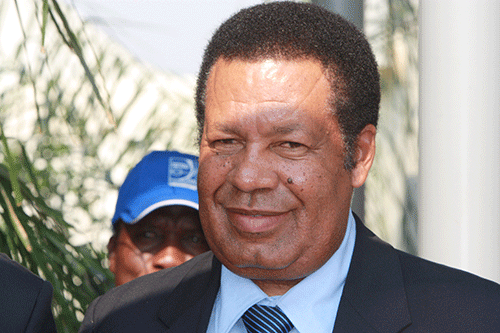The recently-conducted extensive facilities audit in both Namibia and Botswana is further proof that the two countries remain fully committed to their quest to jointly host a memorable Africa Cup Nations (Afcon) in 2027, deputy chairperson of the joint bid committee John Muinjo has reiterated.
Namibia and Botswana have undertaken to jointly bid as hosts of the 2027 Afcon, a bid which the two countries have christened ‘BONA 2027’ – a moniker that also contains the first two letters of both countries’ names.
Sharing the latest details around the recent extensive facilities audit in both countries by renowned South African-based architect Ruben Reddy, Muinjo yesterday underscored the importance of the facilities audit process and how it will further give shape to the ongoing bid process as a whole.
“This was a very important process [facilities audit] because it will now pave way for other equally crucial processes such as compiling the official bid book and so forth. Architect Ruben Reddy and the team are now hard at work trying to ensure that the facilities audit report is finalised well in time so that we submit it to the relevant ministries of both countries, and also get started with the bid book process,” he said.
“The primary objective for us as a joint bid technical committee is to come up with a comprehensive bid book that will help us win rights to co-host Afcon 2027. Finalising the bid book on time will also be key because that is where both countries will position themselves as the best possible hosts, promote and create international awareness on their joint capabilities to successfully stage the tournament.
Muinjo, who is also a former Namibia Football Association president, also shared that both the facilities audit report and the bid book will clearly outline exactly what kind of renovations need to take place at the various stadiums or whether both countries will need to build new facilities altogether.
Once fully completed and well packaged, the bid book will then be submitted to Caf for further scrutiny and comparison with other bidders for the 2027 Afcon.
He said the bid book is a very crucial and important book because all the participating countries are going to provide one.
“After the bid book process, we will also have to train our bid ambassadors because they will be people who will be promoting this bid and making sure it leaves a lasting legacy in both countries and in the region as well. But as I said, we will continue lobbying and engaging all stakeholders with the aim to perfect our bid.”
Away from the infrastructural side of things, hosting Afcon also bolsters the host countries’ arts and entertainment industries, amongst others. Afcon creates hundreds of seasonal jobs and crafts for the locals, and that leads to an immediate decline in the unemployment rate during the Afcon period alone.
Also, traditionally, the host country receives in excess of 20% of all revenue generated from the tournament, including tickets, television returns, and advertisements on the pitch, to mention but a few.
]There is, however, no denying that hosting a large-scale sporting event such as Afcon comes at a great financial cost.
It involves years of planning and investment by the host country to ensure all necessary infrastructural work gets done in time and meets all international requirements.
The kind of investment into hosting Afcon is no doubt a daunting task for any country, as the country is expected to bear all costs related to the participating teams, including the internal transportation of the teams, referees, Caf president, executive committee and secretary general as well as hundreds of other delegates.
However, countries still opt to host Afcon because they believe there will be positive economic and social spin-offs.
– ohembapu@nepc.com.na


